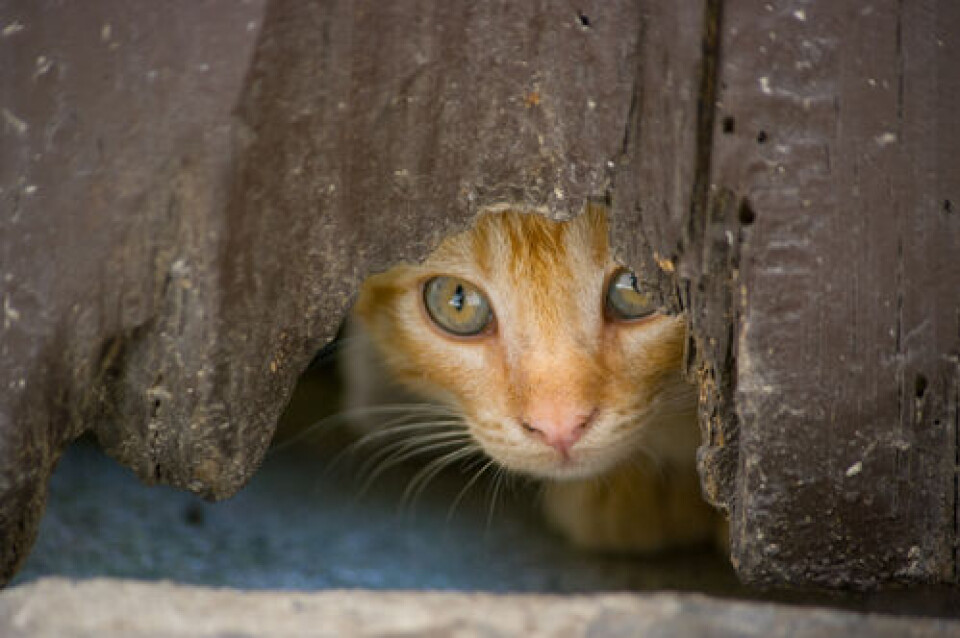-
What do I need to do if my pet dies in France?
French regulations require animals to be cremated
-
How accurate are time estimates for French hiking paths?
Mathematical formula is basis for sign figures
-
My French cleaner is too familiar with me
Columnist Cynthia Spillman advises a reader on setting boundaries
What can I do about neighbour’s cat leaving mess in our French garden?
We look at the possible courses of action, from natural deterrents to legal procedures

Reader Question: Our neighbour’s cat keeps coming into my garden and leaving mess. Is there anything we can do?
French law allows you several courses of action in such a situation (it goes without saying that any form of animal cruelty is subject to strict penalties).
The first things you can do involve using simple methods to try and deter the cat from making itself at home in your garden.
Cats generally dislike strong citrus scents as well as coffee, raw garlic, vinegar, lavender, rue and lemongrass. You could therefore try sprinkling brewed coffee grounds on your lawn, or planting plants which the animals dislike, to see if it keeps them away.
If this does not work, you can visit your neighbour to explain and ask if they could take steps to stop it. A more formal avenue is to send a recorded delivery letter (see below).
If your neighbour is not responsive, you could enlist the services of a conciliateur de justicemediator. This process is free and the conciliateur may be able to help you find a friendly agreement with your neighbour. It is also a requirement before considering court action for trouble anormal de voisinage.
Your closest mediator can be found here.
If this is successful, you will sign a statement with your neighbour detailing the action you both promise to take.
Stronger measures
You may be able to put an end to the disturbance if you can prove trouble anormal de voisinage (abnormal neighbourhood disturbances). For this to be applicable, noise or odours must be a regular occurrence, so if the cat is defecating or urinating in your garden regularly and you can prove it, you might have a case.
Similarly, if the cat often comes into your garden and disturbs you by repeated miaowing, you might be able to take action.
In the case of noise nuisance, however, it should be especially intense, repetitive or long-lasting for this to apply for noise during the day. That is not necessarily the case for ‘tapage nocturne’ at night.
In this case you could appeal to your local mairie to intervene to put a stop to the disturbances as part of its role is to keep the peace. A model letter designed for this purpose (focusing on noise) can be found here.
It is also possible to make a complaint to the gendarmerie or local police. Note however there are potential serious consequences in the case of being considered to have made a police complaint that you should have known was not entirely true, so do not be tempted to exaggerate the situation.
Finally, you could take the matter to the tribunal de proximité court if you have sufficient evidence, for example in photographic form, through testimonies from other neighbours or through a statement from a huissier (bailiff).
The judge could require your neighbour to pay damages and interest, as well as outlining the measures they will take to address the issue.
This can still be done even if you previously came to an agreement with the neighbour, if the disturbances persisted regardless.
Responsabilité civile insurance
If the cat causes damage to you or your possessions, you could also potentially claim on the neighbour’s responsabilité civile insurance.
This would only apply if, for example, the cat has caused a visible injury by scratching you, biting you, or setting off a serious allergic reaction.
It may also work if the cat has ruined plants in your garden. This damage would need to be proven in the form of photographs for example.
In this case, the cat’s owner would have to compensate you through their responsabilité civile. This would normally be written into their home insurance contract, which should cover damage caused to third parties for which they are responsible.
Example letter
Below is an example of a letter suggested by Le Figaro, which you could send to your neighbour, requesting that they take action with regards to their cat.
Your name and surname
Your address
Your telephone number
Objet: Nuisances causées par votre chat
Madame/Monsieur X,
Je souhaite vous informer des désagréments que je subis, causés par la venue régulière de votre chat dans mon jardin.
Notamment… [List of the issues caused by the cat]
Pour faire cesser ces troubles, peut-être pourrions-nous trouver ensemble des mesures pour limiter le passage entre nos deux jardins de votre animal? Je souhaite retrouver un rapport de voisinage convenable.
Je reste à votre disposition pour discuter de tout cela.
Dans l’attente de votre réponse, je vous prie d’agréer, Madame/Monsieur, l’expression de mes sentiments distingués.
Signature
—----------
Translation:
Subject: Disturbance caused by your cat
Dear Mr/Mrs X,
I wish to inform you of the inconveniences that I am suffering because of the regular appearance of your cat in my garden.
Most notably… [List of the issues caused by the cat]
To put an end to this disturbance, perhaps we could together find some measures to restrict the cat’s movement between our two gardens? I wish to return to a good neighbourly relationship.
Yours sincerely,
Signature
Related articles
Animal first aid course gives French pet owners tips on emergency care
What can we do about dogs’ early morning barking near our French home?
Is noisy barking now legal as part of French countryside ‘heritage’?
























